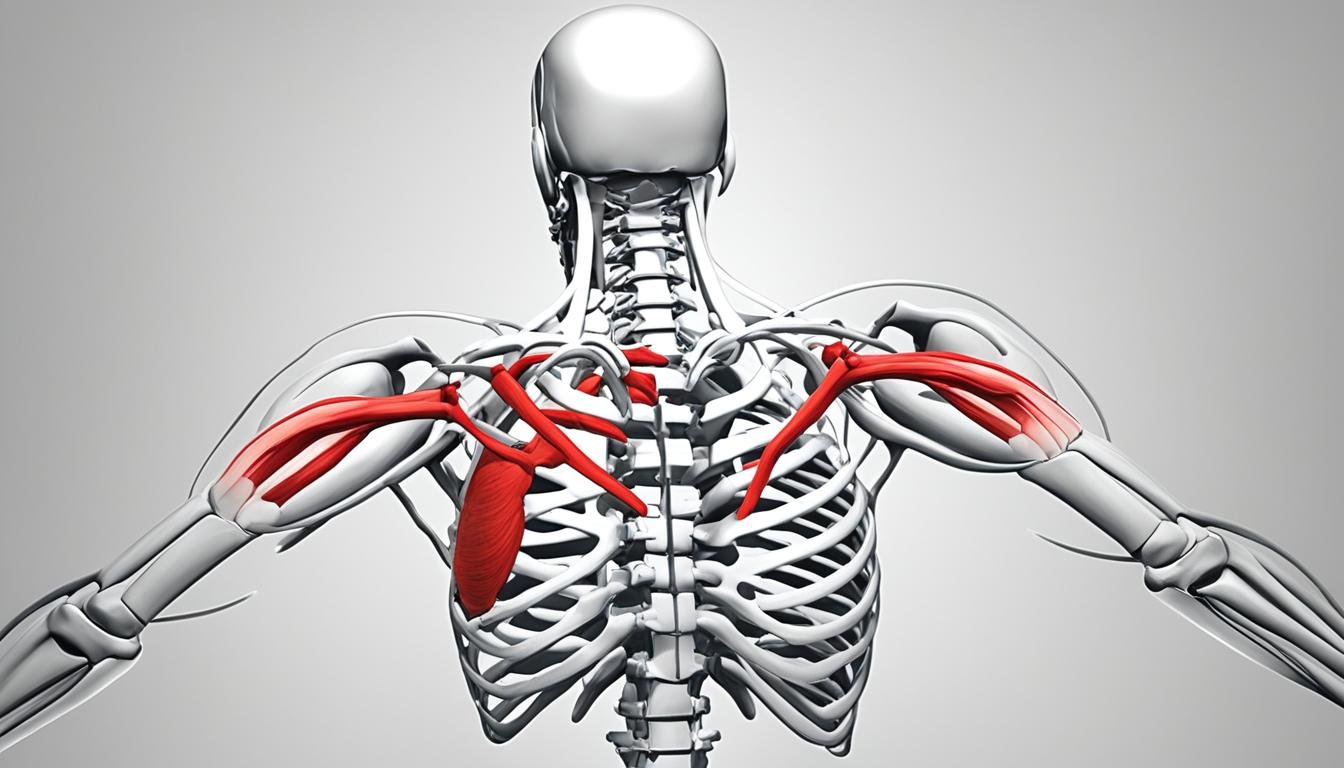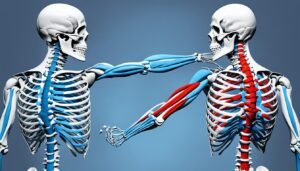Feeling pain or numbness in your mid back? It might be a pinched nerve. The Mayo Clinic says a pinched nerve happens when something presses too hard against a nerve. This something can be your bones, muscles, or tendons. It can lead to pain, numbness, tingling, and muscle weakness.
Pinched nerves in your mid back, or thoracic spine, often come from issues like herniated discs, spinal stenosis, or bone spurs. The National Institute of Neurological Disorders and Stroke states they’re pretty common, affecting about 85 adults in every 100,000 yearly. It’s key to get treatment quickly to avoid lasting nerve damage.
Key Takeaways
- Pinched nerves in the mid back can cause radiating pain, numbness, tingling, and muscle weakness.
- Common causes of mid back pinched nerves include herniated discs, spinal stenosis, and bone spurs in the thoracic spine.
- Pinched nerves are relatively common, affecting around 85 out of 100,000 adults each year.
- Prompt treatment is important to prevent permanent nerve damage.
- Women are more susceptible to developing pinched nerves, such as carpal tunnel syndrome.
Understanding Pinched Nerves
A pinched nerve happens when a nerve is squeezed by nearby tissues. This can cause pain, tingling, or numbness. Pinched nerves often occur in the neck, upper back, and lower back. They can also happen in the wrist and elbow.
What is a Pinched Nerve?
A pinched nerve is caused by too much pressure from nearby bones or muscles. This pressure leads to pain, tingling, or numbness in the area.
Common Locations of Pinched Nerves
Pinched nerves are usually in the neck, upper back, or lower back. They can also be in the wrist or elbow. About 85 out of 100,000 adults get pinched nerves every year.
Causes of Mid Back Pain from a Pinched Nerve
Some common reasons for pinched nerve mid back pain are described by the Mayo Clinic and the National Institute of Neurological Disorders and Stroke.
Herniated Discs
A herniated disc thoracic spine can press on nearby nerves, causing mid back pain. This happens when the soft inside of a disc sticks out through its outer layer.
Spinal Stenosis
Mid back spinal stenosis means the spinal canal in the thoracic area gets narrower. This can squeeze the nerve roots and lead to thoracic spine compression and nerve root impingement.
Bone Spurs
Osteoarthritis and some spine issues make bone spurs grow. These can push into the spinal canal and press on the nerves. That’s why it hurts in the mid back.
Symptoms of a Pinched Nerve in the Mid Back
When a nerve gets pressed in your middle back, it can hurt a lot. This makes it tough to move. If you feel a sudden or sharp pain in your back, it could be a pinched nerve.
Radiating Pain
One big sign of a pinched nerve is pain that spreads. It might start in your back and go to your chest or arms. You could feel an ache or a sharp, shooting pain.
Numbness and Tingling
A pinched nerve can also make you feel numb or tingly. It feels like pins and needles. This can happen in your back, chest, or even hands. It’s called radiculopathy.
Muscle Weakness
Some people with a pinched nerve find their muscles are weak. They might not be able to lift their arms well. Or have a hard time holding things. This is because the nerve can’t send the right signals to these muscles.
If you have these pains, it’s smart to see a doctor. They can tell you what’s wrong and how to fix it. Don’t wait too long, as a pinched nerve can get worse.
pinched nerve mid back pain
A pinched nerve in the mid back can hurt a lot and make it hard to move. The Mayo Clinic and the National Institute of Neurological Disorders and Stroke say it’s often due to problems like herniated discs or spinal stenosis. These issues press on the nerve roots in the mid back. This pressure causes pain between the shoulder blades, tingling in the arms, and arm weakness.
Pinched nerves in the thoracic spine are not as common as in the neck and lower back. But, they can still cause mid back muscle spasms and nerve pain. Finding and treating the problem early is key. This stops serious symptoms and nerve pain between the ribs.
Feeling mid back pain or other odd symptoms? Get help from a doctor soon. They can find what’s wrong and plan how to help you feel better from pinched nerve mid back pain.
Risk Factors for Pinched Nerves
Age, repetitive motions, and obesity increase the risk of a pinched nerve. Knowing these factors can help prevent a pinched nerve in your mid back.
Age
As you age, your spine parts like discs and joints can start to wear. This can press on nerves in your back. This is why people over 50 are more likely to have pinched nerves.
Repetitive Motions
Doing the same hand, wrist, or shoulder actions over and over can increase your risk. Jobs like assembly lines, typing, certain sports, or using tools can cause this. It leads to nerve compression and pain in your back.
Obesity
Being overweight, especially in the middle, puts more pressure on your mid back nerves. This can lead to pinched nerves and other issues. Staying at a healthy weight lowers your pinched nerve risk.
Knowing these risk factors can help you prevent a pinched nerve. Regular exercise, good posture, and a healthy weight are important. They reduce the chance of getting this painful problem.
Diagnosing a Pinched Nerve in the Mid Back
Finding out what’s causing your pinched nerve mid back pain is key to treatment. Experts, like the National Institute of Neurological Disorders and Stroke, say it’s done by checking you and using tests like physical examination and imaging tests.
Physical Examination
Your doctor will look at your symptoms and history during the physical examination. They’ll also do tests to figure out why your mid back hurts. This might include checking for tenderness or muscle weakness.
Imaging Tests
Your doctor might order tests as well. These imaging tests can find out what’s pressing on your nerve. Tests may include:
- X-rays to look for spine damage that might be pressing on a nerve
- Magnetic resonance imaging (MRI) to see if there are herniated discs or other root issues
- Electromyography (EMG) to check how your muscles work and locate damaged nerves
Putting together the exam and test results helps find the cause of your problem. Then, your care team can plan the right treatment.
Non-Surgical Treatments for Mid Back Pain Relief
If you have a pinched nerve in the mid back, there are non-surgical ways to help. The Mayo Clinic and other experts say these methods work well. Some things you can try include:
Rest and Pain Medication
Resting lets your body heal without much strain. Using over-the-counter drugs like ibuprofen or naproxen can make you feel better. They reduce swelling and ease the pinched nerve mid back pain.
Physical Therapy
Physical therapy is important. It uses exercises to make your back stronger and less painful. A therapist will show you how to stretch and move better, helping your pinched nerve by fixing your posture.
Epidural Steroid Injections
For some, epidural steroid injections might help a lot. They can reduce swelling and pain from a pinched nerve mid back pain. Their effects can last from a week to more than a year.
Surgical Options for Severe Cases
If conservative treatments don’t work for a pinched nerve in the mid back, spinal surgery might be the next step. This advice comes from Dr. Nima Salari, an expert orthopedic spine surgeon. He suggests two kinds of surgery. They are endoscopic discectomy and endoscopic foraminoplasty.
Endoscopic Discectomy
If a herniated disc is pressing on a nerve in the mid back, an endoscopic discectomy can help. This uses a tiny camera and tools to cut away the part of the disc causing trouble. It helps to relieve pain by taking the pressure off the nerve.
Endoscopic Foraminoplasty
When spinal stenosis is squeezing a nerve in the mid back, an endoscopic foraminoplasty might be the solution. This surgery widens the path where the nerve exits the spine. By doing so, it eases the pressure and symptoms.
These surgeries are for people with severe mid back pain from a pinched nerve that won’t go away with usual treatments. They can help bring relief and a better quality of life when other options haven’t worked.
Prevention of Pinched Nerves in the Mid Back
To avoid pinched nerves in the mid back, it’s key to stand and sit up straight. Also, make sure to move around, stretch a lot, and keep your weight where it should be. Doctors say these actions can stop pinched nerves from forming.
Proper Posture
Slumping or sleeping oddly can hurt your mid back. This is because it can pinch nerves there. Always try to have good posture. Stand with your shoulders back, chest out, and your spine straight. This can keep nerves from getting pressed on.
Exercise and Stretching
Doing regular exercise and stretching can make your mid back stronger and more bendy. This means pinched nerves are less likely to happen. Yoga, Pilates, and moves that focus on your back and shoulders are great for this.
Maintaining a Healthy Weight
Staying at a good weight is crucial for mid back nerve health. Extra pounds can push on your mid back more. This can lead to nerve problems.
Focusing on keeping a straight posture, moving and stretching, and staying at a healthy weight can save you pain and trouble. These simple steps are key to steering clear of mid back pinched nerves.
When to Seek Medical Attention
Most cases of a pinched nerve in the mid back get better with home treatment. This includes rest, using over-the-counter drugs, and physical therapy. But, if the pain doesn’t go away or gets worse, you must see a doctor. A pinched nerve untreated can cause lasting pain and damage.
After trying at-home care for a few days with no luck, it’s wise to seek help. The longer you wait, the higher the risk of more damage. So, it’s better to seek help early than wait.
Your doctor can figure out what’s causing your pinched nerve. They can then make a plan to help you feel better. If self-care isn’t working, don’t wait to get medical advice.
Conclusion
Middle back pain from a pinched nerve can be tough. But, there are ways to treat it. It’s important to know why it happens. Things like herniated discs, spinal stenosis, and bone spurs play a part. So does feeling pain that spreads, goes numb, tingles, or weakens muscles. These signs tell you to get help.
Pinched nerves in your middle back are not rare, especially as you get older. To stop or manage it, good habits are key. Keep a straight back, exercise, stretch, and stay fit. These will cut your chances of a pinched nerve and make mid back pain less.
If your mid back pain is not going away or getting worse, see a doctor. They can figure out what’s wrong and how to fix it. Getting the right treatment can help you heal and stop more nerve harm.




